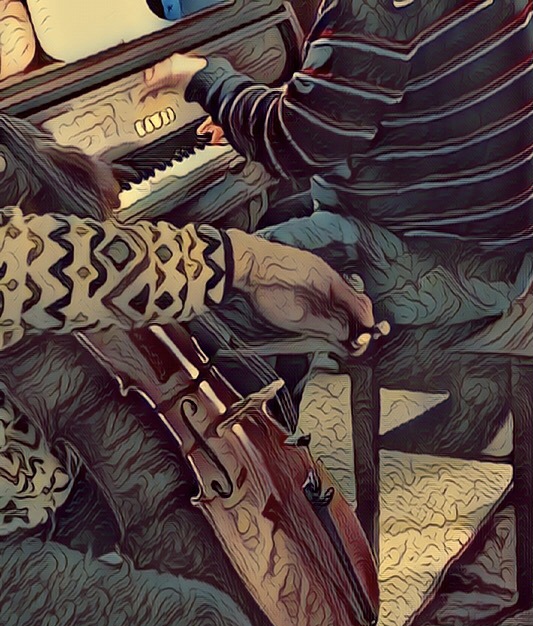That is the only reason why I desire solitude—to be lost to all created things, to die to them and to the knowledge of them, for they remind me of my distance from You. They tell me something about You: that You are far from them, even though You are in them. You have made them and Your presence sustains their being, and they hide You from me. And I would live alone, and out of them. O beata solitudo!
For I knew that it was only by leaving them that I could come to You: and that is why I have been so unhappy when You seemed to be condemning me to remain in them. Now my sorrow is over, and my joy is about to begin: the joy that rejoices in the deepest sorrows. For I am beginning to understand. You have taught me, and have consoled me, and I have begun again to hope and learn.
I hear You saying to me:
“I will give you what you desire. I will lead you into solitude. I will lead you by the way that you cannot possibly understand, because I want it to be the quickest way.
“Therefore all the things around you will be armed against you, to deny you, to hurt you, to give you pain, and therefore to reduce you to solitude.
“Because of their enmity, you will soon be left alone. They will cast you out and forsake you and reject you and you will be alone.
“Everything that touches you shall burn you, and you will draw your hand away in pain, until you have withdrawn yourself from all things. Then you will be all alone.
“Everything that can be desired will sear you, and brand you with a cautery, and you will fly from it in pain, to be alone. Every created joy will only come to you as pain, and you will die to all joy and be left alone. All the good things that other people love and desire and seek will come to you, but only as murderers to cut you off from the world and its occupations.
“You will be praised, and it will be like burning at the stake. You will be loved, and it will murder your heart and drive you into the desert.
“You will have gifts, and they will break you with their burden. You will have pleasures of prayer, and they will sicken you and you will fly from them.
“And when you have been praised a little and loved a little I will take away all your gifts and all your love and all your praise and you will be utterly forgotten and abandoned and you will be nothing, a dead thing, a rejection. And in that day you shall begin to possess the solitude you have so long desired. And your solitude will bear immense fruit in the souls of men you will never see on earth.
“Do not ask when it will be or where it will be or how it will be: On a mountain or in a prison, in a desert or in a concentration camp or in a hospital or at Gethsemani. It does not matter. So do not ask me, because I am not going to tell you. You will not know until you are in it.
“But you shall taste the true solitude of my anguish and my poverty and I shall lead you into the high places of my joy and you shall die in Me and find all things in My mercy which has created you for this end and brought you from Prades to Bermuda to St. Antonin to Oakham to London to Cambridge to Rome to New York to Columbia to Corpus Christi to St. Bonaventure to the Cistercian Abbey of the poor men who labor in Gethsemani:
“That you may become the brother of God and learn to know the Christ of the burnt men.”
SIT FINIS LIBRI, NON FINIS QUAERENDI
So Merton ends his book with the Latin phrase: "SIT FINIS LIBRI, NON FINIS QUAERENDI." Translation--"This may be the end of the book, but not the end of the quest." The conclusion is not a conclusion, but a new beginning. Merton takes his final vows. Becomes a Trappist monk. Renounces all the things of the material world that distract him from God.
It is New Year's Eve. Almost 2 a.m. as I type this. I may not finish this post before I need to go to sleep. At the end of 2021, I wish to put an end to this burning dumpster heap of a year. I want this night to be the last page, and I'm not sure I want to continue the book of 2021. Yes, some wonderful things have happened to me--new job, NEA grants, an award for Arts Advocate of the Year. But, on the flipside, the first chapter of 2021 started with COVID quarantine, and the last chapter comes full circle. COVID quarantine again. My mother died. This morning, I woke up sick. I'm pretty sure it's COVID. Went to get tested, but the Health Department testing center is closed for the holiday. And, to top it all off, Betty White died today.
Like I said, pour some gasoline on 2021 and light a match.
To try to salvage this last day of 2021 for my son, I ordered from Pizza Hut for lunch. Then I took him to a huge Christmas lights display tonight. Let him run around with our puppy. Took pictures. When we got home, we played some board games, watched a couple movies. Counted down the last seconds to midnight. Blew some horns. Raised a glass and let my son give a toast.
He talked about his grandma, grandpa, Aunt Sally, and Uncle Kevin in heaven. About getting and staying healthy. Loving his parents and sister and puppy. In short, my son gets it. He knows what's important.
At midnight, I sent text messages to everyone I love. My daughter, who's staying at her boyfriend's parents' house to avoid infection. My sisters. My sisters-in-law . A couple of my closest friends. Because that is what's important. The people in my life. Pretty much everything I do in my life is for them. Period.
So, as I say goodbye to Thomas Merton after this two-year journey, I am ready for this quest to end and a new one to begin.
Tomorrow, I start a new book. Something simpler. But beautiful. The big reveal to happen in my first post of 2022. As Merton says, ". . . and I have begun again to hope and learn."
Saint Marty is ready for a little hoping and learning, starting tomorrow.







